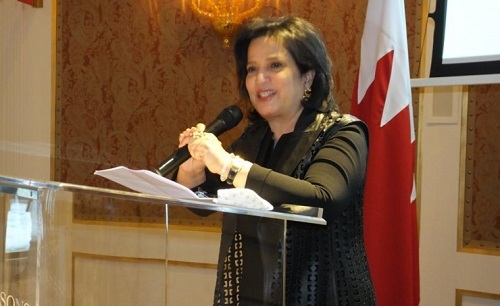Madrid: Bahrain’s candidate for the post of United Nations World Tourism Organization Secretary-General Shaikha Mai bint Mohammed Al Khalifa has highlighted her vision for the future of UNWTO to diplomats accredited in Madrid.
Shaikha Mai, the President of Bahrain Authority for Culture and Antiquities (BACA), explained how her strategy depended upon seven pillars and stressed the need to be relentless in defining and delivering achievable outputs that maximize contribution to the Sustainable Development Goals.
She explained how she would be a dynamic leader of UNWTO and would work devotedly to ensure that UNWTO becomes a living example of sustainability, diversity, integrity and responsibility.
UNWTO has a moral imperative to help alleviate the plight of those at the lower end of the industry’s employment ladder placed by the lockdown of tourism globally in danger of extreme poverty, she highlighted.
Crisis management and future planning and SDGs are among the seven pillars upon which Shaikha Mai has built her vision for the future of UNWTO.
Shaikha Mai, who in 2017 was appointed Ambassador of the International Year of Sustainable Tourism for Development and praised for her role in advancing culture as a key component of tourism development in Bahrain and the Middle East, has stressed that tourism at its best is an astonishing tool for sustainable development.
Shaikha Mai is a pioneering figure in the Arab cultural scene through her work in the fields of culture and arts.
Since 2008, she has held several official positions, including Assistant Undersecretary for Culture and National Heritage (2002-2004) and (2005-2008), Minister of Culture and Information (2008-2010) and Minister of Culture (2010-2015).
She is currently the Chair of the Board of Directors of the Arab Regional Center for World Heritage (ARC-WH).
Shaikha Mai is the founder and chairperson of the Board of Trustees of the Shaikh Ibrahim bin Mohammed Al Khalifa Center for Culture and Research, a non-profit and non-governmental center that aims to promote culture and preserve Bahrain’s urban heritage established in 2002.
Motivated by her profound belief in the power of culture and its role in advancing development, and by her strong commitment to protecting and preserving Bahrain’s cultural heritage in all its forms and promoting it locally and internationally, Shaikha Mai is leading national efforts to implement cultural policies and long-term strategies to develop sustainable cultural infrastructure and cultural tourism.
Her clear vision was transformed into reality when she launched the “Investing in Culture” initiative in 2006.
The initiative, unprecedented in the Middle East, contributes to building a partnership between the public and private sectors to invest in cultural projects.
Her vision and leadership transformed the cultural scene in the Kingdom and resulted in the global recognition of Bahrain’s historical and cultural status.
Amid the impressive cultural emergence, three national sites were registered on the UNESCO World Heritage List – Qal’at Al Bahrain – Ancient Harbor and Capital of Dilmun (2005), Pearling, Testimony of an Island Economy (2012) and Dilmun Burial Mounds (2019).
In addition, Bahrain witnessed the establishment of the Arab Regional Center for World Heritage, a UNESCO Center for the second category, the revival of historical areas in the Kingdom, and the construction of the Bahrain National Theater, several museums and cultural centers.
The comprehensive strategy implemented by the Bahrain Authority for Culture and Antiquities under the supervision of Shaikha Mai has led to Bahrain being widely recognized for its experience in setting up cultural infrastructure.
Manama was selected the 2012 Arab Capital of Culture, which strengthened Bahrain’s position in the leadership of cultural activities. Manama was also selected as the Capital of Arab Tourism in 2013 and the Capital of Asian Tourism in 2014.
Shaikha Mai launched the initiative to celebrate Arab Tourism Day in 2012, which has now become an annual celebration on February 25.



